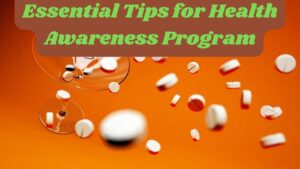Introduction:
Unveiling the Hidden Risks: A Health Alert on Preservatives in Canned Food

In our fast-paced world, the convenience of canned foods is undeniable. However, behind the ease of these ready-to-eat meals lies an unseen threat – preservatives. This article serves as a health alert, shedding light on the potential risks associated with the consumption of preservatives in canned food.
The Health Risks: A Health Alert on Preservatives in Canned Food
Understanding the Issue: Preservatives are commonly used in canned foods to prolong shelf life and maintain freshness. While they play a crucial role in preventing spoilage, there is a growing concern about their impact on human health. This article aims to explore the hidden dangers and raise awareness about the need for a balanced approach to food preservation.
- Chemical Concerns: Many canned foods contain synthetic preservatives such as BHA, BHT, and sodium nitrate, which have been linked to health issues including allergies and respiratory problems.
- Nutrient Depletion: The canning process, coupled with preservatives, may lead to a reduction in essential nutrients, impacting the nutritional value of the food.
- Digestive Distress: Some individuals may experience digestive issues, such as bloating and discomfort, as a result of consuming foods laden with preservatives.
- Potential Long-Term Effects: Research suggests that prolonged exposure to certain preservatives may be associated with more serious health conditions, urging consumers to be mindful of their long-term dietary choices.
Taking Action:
- Read Labels: Empower yourself by reading product labels. Look out for common preservatives and make informed decisions about the foods you choose to consume.
- Opt for Natural Alternatives: Choose canned goods with natural preservatives like citric acid or vitamin E, or consider exploring fresh and frozen alternatives for a healthier option.
- Moderation is Key: While it may be challenging to eliminate all preservatives from your diet, strive for moderation. Incorporate a variety of fresh, whole foods to maintain a balanced and nutritious diet.
How do preservatives affect how long your food will keep?
Preservatives play a crucial role in extending the shelf life of food by inhibiting the growth of microorganisms, such as bacteria, yeast, and molds, which can cause spoilage. The specific ways in which preservatives affect how long food will keep vary depending on the type of preservative used and the characteristics of the food being preserved. Here are some common ways preservatives contribute to food preservation:

- Inhibition of Microbial Growth: Preservatives work by slowing down or inhibiting the growth of microorganisms that cause spoilage. They can disrupt the metabolic processes of these microorganisms, preventing them from multiplying and spoiling the food.
- Prevention of Oxidation: Some preservatives, such as antioxidants, help prevent oxidation, which can lead to the development of off-flavors, colors, and textures in food. By reducing the rate of oxidation, preservatives help maintain the quality of the food over an extended period.
- pH Regulation: Preservatives like citric acid or vinegar can be used to adjust the pH of a product. Controlling the acidity can create an environment less conducive to the growth of spoilage microorganisms, thereby extending the shelf life of the food.
- Moisture Control: Preservatives may help control the moisture content in food, reducing the conditions favorable for microbial growth. This is particularly important in preventing the growth of molds and yeasts.
- Enzyme Inhibition: Enzymes in food can lead to undesirable changes, such as browning or texture deterioration. Some preservatives inhibit these enzymes, preserving the appearance and texture of the food.
It’s important to note that while preservatives are effective in extending shelf life, their use has generated some health concerns. Some synthetic preservatives have been associated with allergic reactions or other health issues. As a result, there is an increasing trend toward the use of natural preservatives and a preference for minimally processed foods.
Consumers are advised to read food labels carefully, understand the types of preservatives used, and make informed choices based on their preferences and health considerations. Additionally, maintaining proper storage conditions, such as refrigeration, can further enhance the effectiveness of preservatives in preserving food quality and safety.
How can eating artificial preservatives affect your health?
Consuming artificial preservatives has been a subject of concern, and while they are generally recognized as safe when used within regulatory limits, some individuals may experience adverse reactions. The impact of eating artificial preservatives on health can vary depending on the type of preservative and an individual’s sensitivity. Here are some potential effects:

- Allergic Reactions: Some individuals may be allergic to specific artificial preservatives. Common preservatives like sulfites (used in dried fruits, wines, and some processed foods) or benzoates (found in soft drinks, pickles, and certain sauces) can trigger allergic reactions in susceptible individuals, leading to symptoms such as hives, itching, or respiratory issues.
- Sensitivity and Intolerance: Some people may be sensitive or intolerant to certain artificial preservatives, experiencing symptoms like headaches, migraines, digestive issues, or behavioral changes. This sensitivity varies among individuals, and identifying specific triggers can be challenging.
- Asthma and Respiratory Issues: Sulfites, which are commonly used as preservatives in foods and beverages, have been linked to asthma symptoms in some individuals. Inhaling sulfite fumes, such as those released when opening a bottle of wine, can exacerbate respiratory conditions.
- Disruption of Gut Microbiota: Some studies suggest that certain preservatives, such as sodium benzoate, may have antimicrobial properties that can affect the balance of gut bacteria. Maintaining a healthy balance of gut microbiota is crucial for overall health, and disruptions may impact digestion and immune function.
- Increased Free Radical Production: Certain preservatives, particularly antioxidants like BHA (butylated hydroxyanisole) and BHT (butylated hydroxytoluene), may act as antioxidants in the body. However, in high doses, they could potentially contribute to increased free radical production, which has been associated with oxidative stress and inflammation.
- Long-Term Health Concerns: While the evidence is not conclusive, some studies suggest potential long-term health concerns associated with the regular consumption of certain artificial preservatives. This includes links to conditions such as cancer and neurodegenerative diseases. However, more research is needed to establish definitive connections.
Conclusion:
“Health Alert: The Unseen Threat of Preservatives in Canned Food” serves as a call to action for consumers to be vigilant about their food choices. By understanding the potential risks associated with preservatives and adopting a mindful approach to consumption, individuals can prioritize their health and well-being in the quest for convenient and nutritious meals.
FAQs:
1. What are preservatives in canned food?
Preservatives are substances added to food products to prevent spoilage, extend shelf life, and maintain freshness. In canned foods, common preservatives include butylated hydroxyanisole (BHA), butylated hydroxytoluene (BHT), and sodium nitrate/nitrite.
2. Why are preservatives used in canned food?
Preservatives help inhibit the growth of bacteria, yeast, and molds, which can spoil food and cause foodborne illnesses. They also maintain the color, texture, and flavor of canned foods over an extended period.
3. What are the hidden risks associated with preservatives in canned food?
While preservatives serve a crucial purpose in extending shelf life, some studies suggest they may pose health risks when consumed in excess. For example, BHA and BHT have been linked to potential carcinogenic effects, and sodium nitrate/nitrite can form harmful compounds called nitrosamines, which are also associated with increased cancer risk.
References:
- Kim, Y., & Lee, J. (2019). Antimicrobial effect of essential oil components against Escherichia coli O157: H7 and Salmonella spp. in commercial mayonnaise. Food Control, 106, 106718.
- European Food Safety Authority (EFSA). (2012). Scientific Opinion on the re-evaluation of butylated hydroxyanisole – BHA (E 320) as a food additive. EFSA Journal, 10(3), 2588.
- IARC Working Group on the Evaluation of Carcinogenic Risks to Humans. (2011). Butylated hydroxyanisole. IARC Monographs on the Evaluation of Carcinogenic Risks to Humans, 101(Pt 3), 1507–1533.
- World Health Organization. (2010). Nitrate and nitrite in drinking-water. Background document for development of WHO Guidelines for Drinking-water Quality.
- Ames, B. N., & Gold, L. S. (1990). Too many rodent carcinogens: mitogenesis increases mutagenesis. Science, 249(4972), 970–971.








